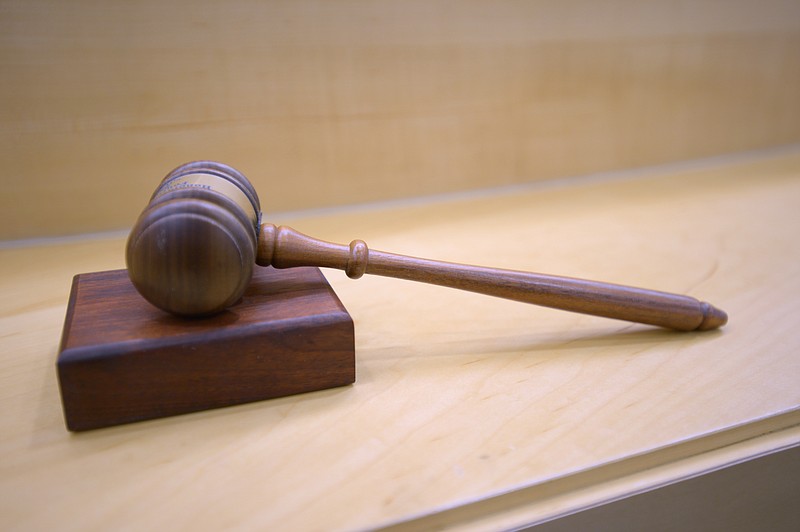A federal judge in Little Rock has set a Jan. 27 hearing in a lawsuit filed last week over the state's redistricting map for the state House of Representatives but said little regarding a recusal motion filed last week in the case.
The ACLU of Arkansas filed suit on Dec. 29 on behalf of the Arkansas State Conference NAACP and the Arkansas Public Policy Panel, challenging the new House district boundaries approved by the Republican -controlled Arkansas Board of Apportionment, a three-member board tasked with setting new legislative maps based on information from the U.S. census every 10 years. Also filed was a motion for a preliminary injunction and request for expedited briefing and consideration.
Two days after that filing, ACLU attorneys filed a motion asking that U.S. District Judge Lee Rudofsky, to whom the case was assigned, recuse himself on the grounds that his past political support of Gov. Asa Hutchinson and Attorney General Leslie Rutledge -- who, along with Secretary of State John Thurston, comprise the board -- could raise questions regarding his impartiality in the case.
Attorneys for the defendants filed a motion on Dec. 31 asking for an extension of time to respond and reply to the preliminary injunction motion, asking that a hearing in the matter be held no earlier than Feb. 2, and to not be scheduled until the conclusion of another voting rights trial brought by the Christian Ministerial Alliance scheduled to begin Jan. 18.
The defendants questioned the timing of the ACLU lawsuit, saying the maps were adopted on Nov. 29 but the lawsuit was not filed until Dec. 29, the date the plan went into effect.
"The tight schedule is a problem entirely of the Plaintiff's making," said the defense motion for extension.
Filing for the preferential primary election and non-partisan elections in Arkansas opens Feb. 22 and closes on March 1.
Rudofsky worked for Rutledge in the attorney general's office from 2015 through 2018, according to a questionnaire he submitted to the Senate Judiciary Committee after he was nominated to the U.S. District Court for Arkansas' eastern district by former President Donald Trump. According to public records, Rudofsky donated $1,000 for Rutledge's re-election campaign in 2017 and $500 to Hutchinson in 2018, and hosted a fundraiser for Rutledge in 2018.
On Monday, Rudofsky issued a ruling setting the hearing for a preliminary injunction for Jan. 27, and ordered defense responses by Jan. 19 at 5 p.m. and plaintiff replies by Jan. 26 at 5 p.m.
"There is good cause for a very limited extension of the briefing schedule -- considering how fact intensive this case is and the size and scope of Plaintiffs' filings," Rudofsky said in Monday's order. "However, Plaintiffs are still correct about the importance of getting to a decision without delay."
Rudofsky said he is hopeful he will be able to rule on the matter by early February. Regarding the recusal motion, the judge said his ruling Monday was without prejudice to that motion and that he would decide on that matter soon, "but the parties need a ruling on the schedule now."
The complaint alleges that the new House map dilutes the voting strength of Black voters by under-representing those voters in majority-minority districts that comprise just 11% of House districts, despite the fact that 16.5% of the state's overall population and 15.5% of the state's voting age population are Black, according to U.S. Census Bureau figures.
The complaint says that an attached illustrative plan shows how an additional five majority Black voting districts could be created by "unpacking" voters in some districts and "uncracking" voters in others.
According to the University of California Annenberg Center, packing and cracking are two strategies employed in gerrymandering to design districts tailored to favor incumbents, increase party influence, or to give voters in a district greater or lesser voting power.
Cracking, the Annenberg Center said, is achieved by spreading like-minded voters apart across multiple districts to dilute their voting power in each. This denies the group representation in multiple districts. Packing, on the other hand, concentrates like-minded voters together in a single district as a way of preventing those voters from having influence in larger elections.
Holly Dickson, executive director of the ACLU of Arkansas, said the reason for asking the hearing to be expedited was to prevent the current House map from being the one that sets the district boundaries in the upcoming House elections.
"If the court is to grant relief, it's possible we can prevail on the case but still suffer through an unlawful map for this election cycle," Dickson said. "We're asking for that short deadline so these maps can't be used for the primary election because we're trying to keep people from being disenfranchised in the upcoming election. ... It's better if these maps don't go into effect at all."
A spokesperson for Hutchinson told the Arkansas Democrat-Gazette last week that the governor is reviewing the litigation. An attorney general spokesperson said last week that Rutledge "will review the lawsuit and respond as appropriate."
Dickson said she favors a non-partisan redistricting process such as one proposed as a constitutional amendment filed with Thurston's office in late December or one that was tossed off the ballot in 2020 on a technicality by the Arkansas Supreme Court.
"We absolutely need that," she said. "The under-representation of Black Arkansans was already an issue and it's exacerbated by these new maps."
Information for this article was contributed by Ryan Tarinelli of the Arkansas Democrat-Gazette.
